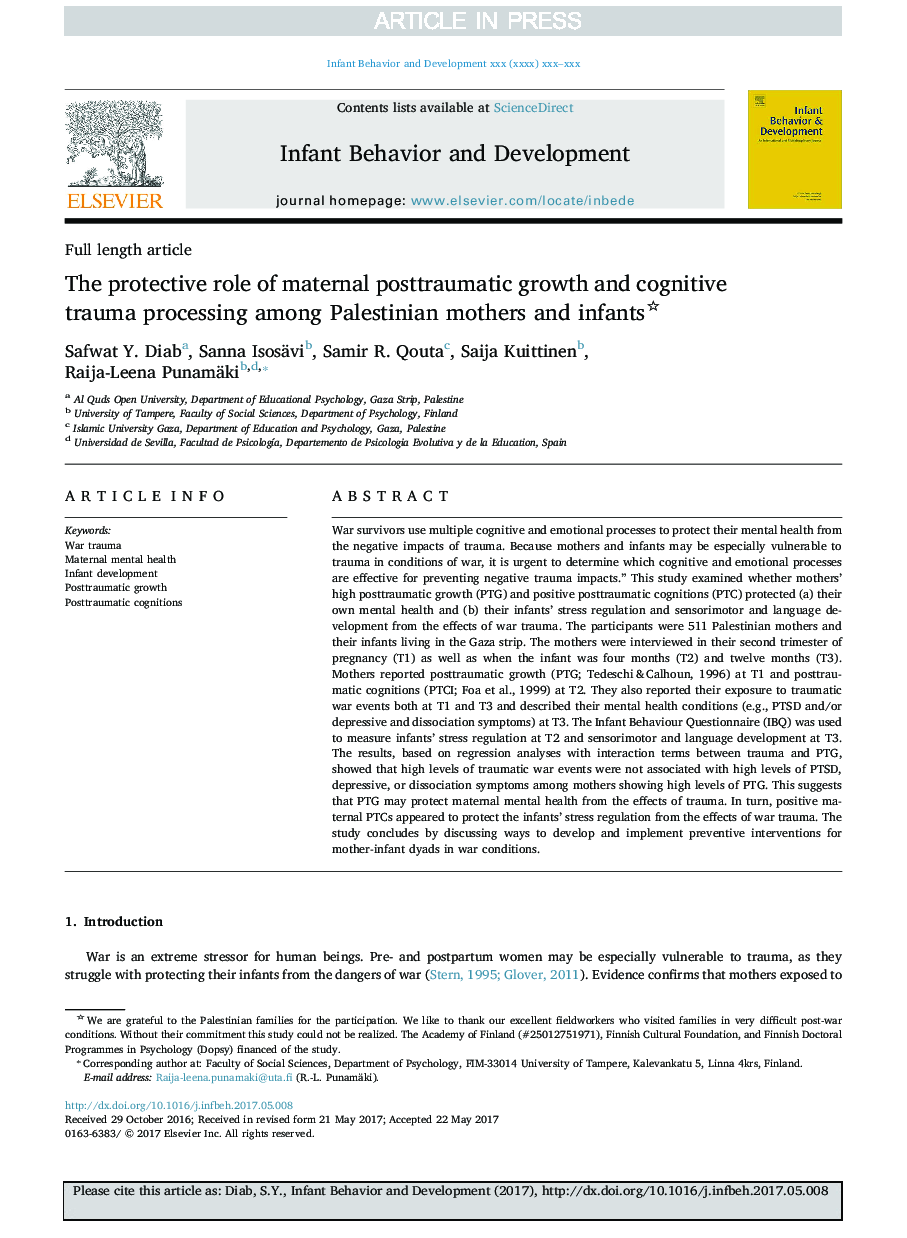| کد مقاله | کد نشریه | سال انتشار | مقاله انگلیسی | نسخه تمام متن |
|---|---|---|---|---|
| 7273061 | 1473412 | 2018 | 16 صفحه PDF | دانلود رایگان |
عنوان انگلیسی مقاله ISI
The protective role of maternal posttraumatic growth and cognitive trauma processing among Palestinian mothers and infants
ترجمه فارسی عنوان
نقش محافظتی رشد پس از قاعدگی مادران و پردازش تروماتیک شناختی در مادران و نوزادان فلسطینی
دانلود مقاله + سفارش ترجمه
دانلود مقاله ISI انگلیسی
رایگان برای ایرانیان
کلمات کلیدی
جنگ تروما سلامت روان مادران، توسعه نوزادان، رشد پس از قاعدگی، تشخیصهای پس از جراحی،
موضوعات مرتبط
علوم زیستی و بیوفناوری
علم عصب شناسی
علوم اعصاب رفتاری
چکیده انگلیسی
War survivors use multiple cognitive and emotional processes to protect their mental health from the negative impacts of trauma. Because mothers and infants may be especially vulnerable to trauma in conditions of war, it is urgent to determine which cognitive and emotional processes are effective for preventing negative trauma impacts.” This study examined whether mothers' high posttraumatic growth (PTG) and positive posttraumatic cognitions (PTC) protected (a) their own mental health and (b) their infants' stress regulation and sensorimotor and language development from the effects of war trauma. The participants were 511 Palestinian mothers and their infants living in the Gaza strip. The mothers were interviewed in their second trimester of pregnancy (T1) as well as when the infant was four months (T2) and twelve months (T3). Mothers reported posttraumatic growth (PTG; Tedeschi & Calhoun, 1996) at T1 and posttraumatic cognitions (PTCI; Foa et al., 1999) at T2. They also reported their exposure to traumatic war events both at T1 and T3 and described their mental health conditions (e.g., PTSD and/or depressive and dissociation symptoms) at T3. The Infant Behaviour Questionnaire (IBQ) was used to measure infants' stress regulation at T2 and sensorimotor and language development at T3. The results, based on regression analyses with interaction terms between trauma and PTG, showed that high levels of traumatic war events were not associated with high levels of PTSD, depressive, or dissociation symptoms among mothers showing high levels of PTG. This suggests that PTG may protect maternal mental health from the effects of trauma. In turn, positive maternal PTCs appeared to protect the infants' stress regulation from the effects of war trauma. The study concludes by discussing ways to develop and implement preventive interventions for mother-infant dyads in war conditions.
ناشر
Database: Elsevier - ScienceDirect (ساینس دایرکت)
Journal: Infant Behavior and Development - Volume 50, February 2018, Pages 284-299
Journal: Infant Behavior and Development - Volume 50, February 2018, Pages 284-299
نویسندگان
Safwat Y. Diab, Sanna Isosävi, Samir R. Qouta, Saija Kuittinen, Raija-Leena Punamäki,
